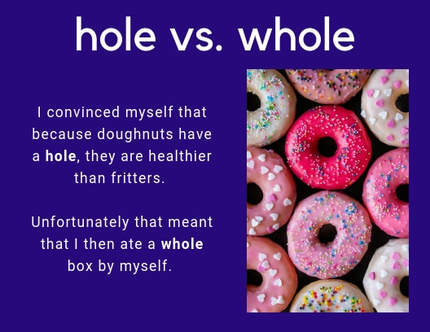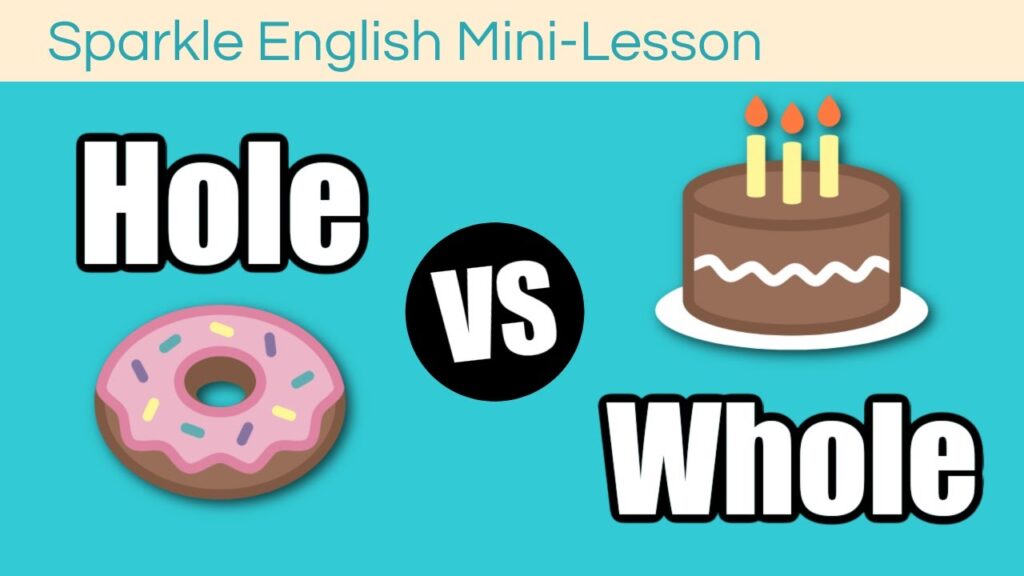Understanding the difference between “whole” and “hole” can be tricky. These two words sound the same but have very different meanings.
“Whole” refers to something complete or entire. For example, a whole pizza means an entire pizza, not missing any pieces. On the other hand, “hole” refers to an empty space or gap, like a hole in the ground or a hole in a donut.
Knowing when to use each word correctly can help you communicate more clearly. In this blog post, we will explore the meanings and uses of “whole” and “hole. ” This will help you avoid common mistakes and improve your writing skills. Ready to learn more? Let’s dive in!

Origins And Etymology
The word “whole” comes from the Old English “hal,” meaning unbroken or intact. On the other hand, “hole” originates from the Old English “hol,” referring to a hollow place or cavity.
Historical Background
The words “whole” and “hole” have different origins. “Whole” comes from Old English “hal”. This means unbroken or entire. “Hole” comes from Old English “hol”. This means a hollow place.
These words evolved over time. People used them in different contexts. “Whole” often described completeness. “Hole” referred to gaps or spaces. The meanings have stayed consistent.
Linguistic Evolution
Language changes with use. “Whole” and “hole” show this. “Whole” is now used in mathematics and health. “Hole” is used in geography and construction. Both words are common.
Understanding their origins helps with proper usage. Knowing the difference makes communication clear. These words have interesting histories. They have changed but kept their core meanings.

Grammatical Usage
Use whole when talking about something complete. For example, “She ate the whole cake.” It means she ate everything. Another example is, “I read the whole book.” It means you read all the pages.
Use hole when talking about an opening or gap. For example, “There is a hole in my shoe.” It means there is a gap in the shoe. Another example is, “The dog dug a hole in the yard.” It means the dog made an opening in the ground.
Common Mistakes
Many people mix up whole and hole. Whole means something is complete. Hole means an empty space. These words sound the same but mean different things.
A whole pizza means a complete pizza. A hole in the ground means an empty space. This mistake can change the meaning of sentences.
To avoid confusion, remember these tips. Think about what you want to say. If you mean complete, use whole. If you mean an empty space, use hole. Double-check your sentences before you finish.
Practice makes it easier. Write sentences using both words. This helps you remember their meanings. Soon, you will not mix them up.
Contextual Examples
Understanding the difference between “whole” and “hole” is crucial. “Whole” means complete or entire, while “hole” refers to an opening or gap. These words sound alike but have very different meanings.
Examples In Sentences
She ate the whole pie by herself. The dog dug a hole in the yard. I read the whole book in one day. There is a hole in my sock. He fixed the whole car by himself. The rabbit hid in a hole.
Real-life Scenarios
Imagine you have a pizza. You can eat the whole pizza or just a slice. If you drop a coin, it might fall into a hole. Think of an apple. You can eat it whole or cut it into pieces. A plumber fixes pipes with holes in them.
Synonyms And Antonyms
Whole means complete. Synonyms include entire, full, and unbroken. Other words are total, intact, and undivided. Each word means no part is missing.
Hole means an opening or gap. Synonyms include pit, cavity, and hollow. Other words are gap, crack, and void. Each word means an empty space.

Cultural References
Authors often use “whole” and “hole” for their symbolic meanings. “Whole” can mean completeness or unity. “Hole” may suggest emptiness or loss. These words add depth to stories. They make readers think about life and existence. For example, a whole heart means love. A heart with a hole means pain.
Movies, songs, and TV shows use “whole” and “hole” too. A famous song might talk about a hole in the heart. This means feeling sad. A movie might show a family becoming whole again. This means they are happy together. These words help us understand feelings better. They make stories more relatable.
Tips And Tricks
To remember the difference, think of a whole pie. The pie is complete. A hole is empty. You can put your hand through it. Whole means all of something. Hole means a gap or space.
Fill in the blanks with the correct word.
- The dog dug a _______ in the yard.
- I ate the _______ pizza by myself.
- She found a _______ in her sock.
- We need the _______ team to win the game.
Conclusion
Understanding the difference between “whole” and “hole” is essential. These words sound similar but mean different things. “Whole” refers to completeness. “Hole” signifies an empty space. Knowing their meanings helps in clear communication. It avoids confusion in writing and speaking.
Practice using them correctly in sentences. Soon, it will become second nature. Clear language boosts understanding. Keep learning and improving your English skills.

